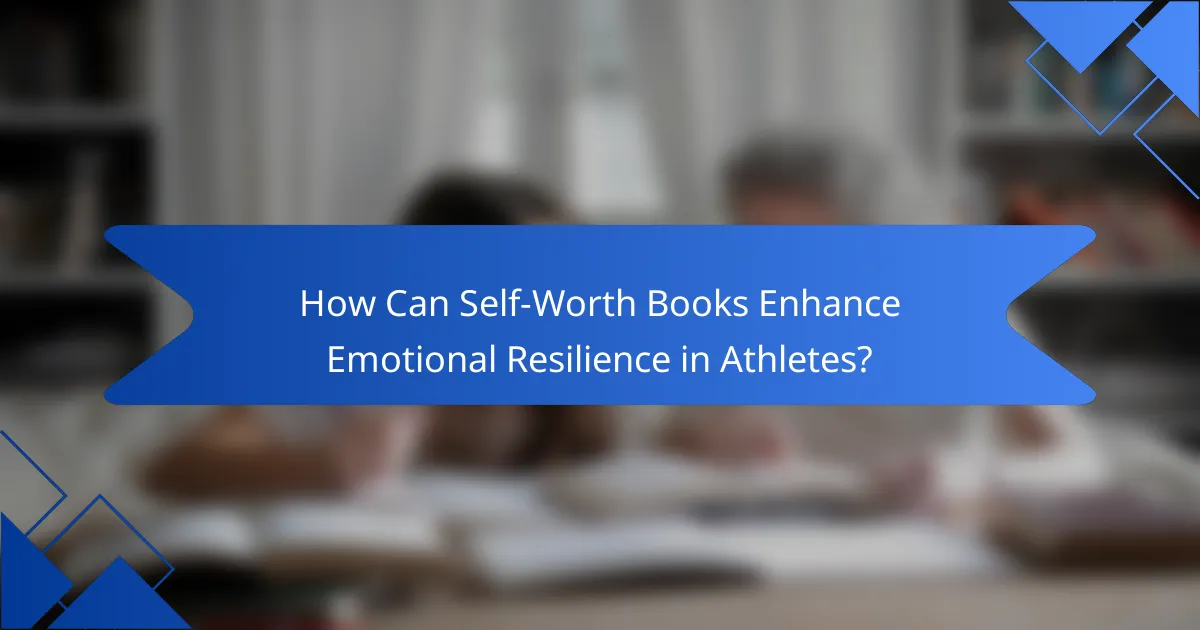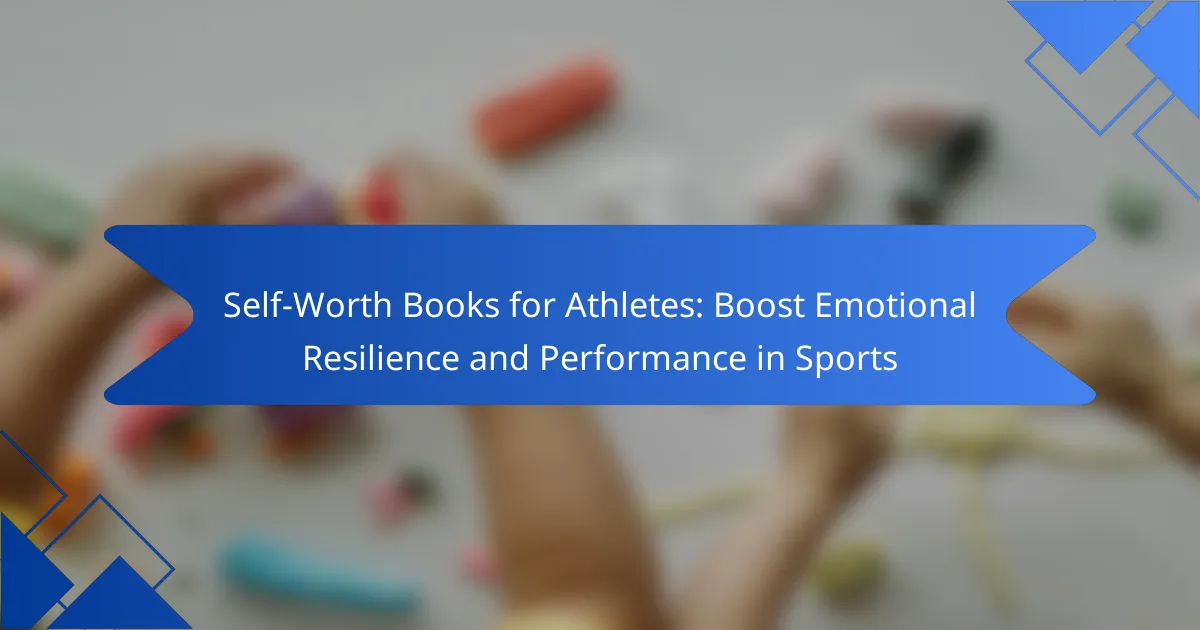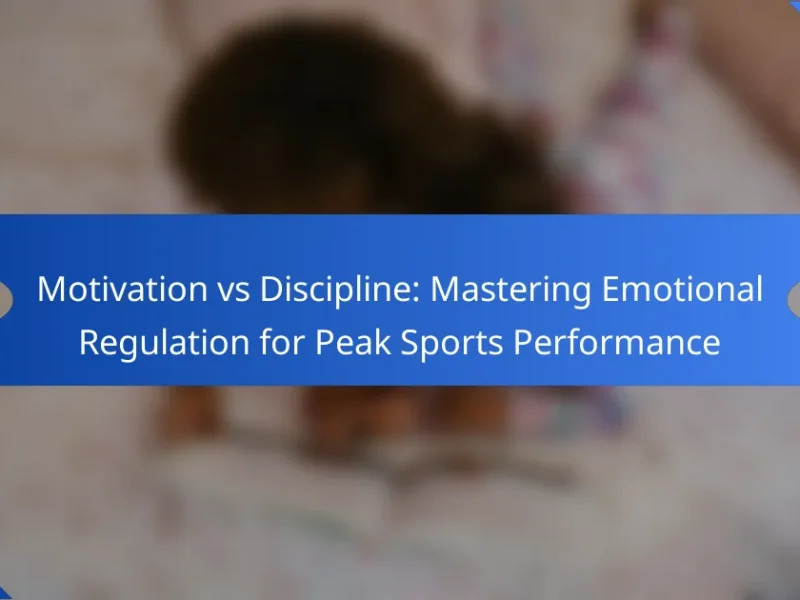Self-worth books can significantly enhance emotional resilience in athletes, providing essential tools for self-reflection and confidence-building. These resources focus on stress management, improving focus, and fostering a growth mindset. They also emphasize self-acceptance and goal-setting, which directly influence performance. Athletes can learn strategies for managing performance anxiety and the importance of self-compassion, leading to improved recovery and sustained motivation.

How Can Self-Worth Books Enhance Emotional Resilience in Athletes?
Self-worth books can significantly enhance emotional resilience in athletes by providing tools for self-reflection and confidence-building. These resources cultivate a positive mindset, essential for overcoming challenges in sports.
They often include techniques for managing stress, improving focus, and fostering a growth mindset. For example, many self-worth books emphasize the importance of self-acceptance and goal-setting, which can directly influence performance.
Research indicates that athletes who engage with self-worth literature report higher levels of motivation and lower anxiety. This unique attribute of fostering mental strength is crucial in competitive environments.
Incorporating lessons from these books can lead to improved emotional regulation, helping athletes navigate the pressures of competition more effectively. As a result, self-worth books serve as valuable tools in the pursuit of athletic excellence.
What Are the Key Themes in Self-Worth Literature for Athletes?
Self-worth literature for athletes emphasizes themes of resilience, identity, and mental strength. These books often highlight the importance of self-acceptance and the impact of mindset on performance. They encourage athletes to redefine success beyond external achievements. Additionally, they address the role of emotional intelligence in overcoming challenges and fostering a positive self-image. Many texts incorporate practical strategies for developing self-worth, such as goal-setting and visualization techniques.
Why Is Emotional Regulation Critical for Sports Performance?
Emotional regulation is critical for sports performance because it enhances focus and resilience under pressure. Athletes who manage their emotions effectively can maintain peak performance even in stressful situations. Self-worth books for athletes provide strategies to develop emotional resilience, enabling them to handle setbacks and improve overall performance. These resources often include techniques for mindfulness, self-affirmation, and cognitive restructuring, which are essential for fostering a positive mindset. As a result, athletes can cultivate a strong sense of self-worth that directly impacts their performance on the field.
What Techniques Do Self-Worth Books Suggest for Emotional Regulation?
Self-worth books suggest various techniques for emotional regulation, including mindfulness practices, cognitive restructuring, and goal setting. Mindfulness helps athletes stay present, reducing anxiety. Cognitive restructuring encourages reframing negative thoughts, enhancing self-esteem. Goal setting provides clear objectives, boosting motivation and focus. These techniques collectively foster emotional resilience, crucial for performance in sports.
What Unique Benefits Do Self-Worth Books Offer Compared to Traditional Sports Psychology?
Self-worth books offer unique benefits by focusing on emotional resilience, unlike traditional sports psychology, which often emphasizes performance metrics. These books cultivate self-acceptance and confidence, enabling athletes to manage pressure effectively. They promote a holistic view of success, integrating mental and emotional well-being alongside physical performance. This approach fosters long-term growth and fulfillment in sports, making self-worth books a valuable resource for athletes seeking deeper personal development.
How Do Personal Stories in These Books Influence Athlete Mindsets?
Personal stories in self-worth books for athletes significantly enhance their mindsets by providing relatable experiences and strategies for overcoming challenges. These narratives foster emotional resilience, allowing athletes to connect deeply with the content. As a result, they can internalize lessons and apply them to their own journeys. Personal anecdotes often highlight the importance of self-acceptance and perseverance, which are crucial for performance in sports. Furthermore, these stories can serve as motivational tools, inspiring athletes to push through adversity and embrace their self-worth.
What Are the Core Features of Effective Self-Worth Books for Athletes?
Effective self-worth books for athletes focus on building confidence, emotional resilience, and performance enhancement. Key features include practical exercises, relatable anecdotes, and research-based strategies. Unique attributes often found in these books are tailored advice for specific sports and mental conditioning techniques. Additionally, they emphasize the importance of a growth mindset, helping athletes overcome setbacks.

What Rare Insights Can Athletes Gain from Self-Worth Books?
Self-worth books provide athletes with unique insights that enhance emotional resilience and performance. These books often explore themes of self-acceptance and mental strength, which are crucial for overcoming challenges in sports.
One rare insight athletes gain is the understanding of intrinsic motivation. This concept shifts focus from external rewards to personal growth, fostering a deeper connection to their sport.
Additionally, self-worth books can offer strategies for managing performance anxiety. Techniques such as mindfulness and positive self-talk empower athletes to maintain composure during high-pressure situations.
Finally, these resources often highlight the importance of self-compassion. Athletes learn to treat themselves with kindness during setbacks, which can lead to improved recovery and sustained motivation.
How Do Cultural Perspectives Shape the Content of Self-Worth Books?
Cultural perspectives significantly influence the content of self-worth books for athletes by shaping their emotional resilience and performance strategies. These books often reflect cultural values that prioritize teamwork, discipline, and mental toughness, which resonate with athletes. For instance, Western cultures may emphasize individual achievement, while collectivist cultures might focus on community support and collaboration. This cultural framing affects how self-worth is perceived and cultivated among athletes, guiding their approach to challenges and successes. As a result, athletes can find tailored strategies that align with their cultural backgrounds, enhancing their emotional resilience and performance in sports.
What Are the Most Common Mistakes Athletes Make When Choosing Self-Worth Books?
Athletes often make mistakes by choosing self-worth books that lack practical application, fail to resonate emotionally, or provide generic advice. A common error is prioritizing popularity over relevance, leading to a disconnect between the content and their personal experiences. Additionally, some athletes overlook the importance of author credibility, which can diminish the book’s impact. Lastly, not considering the book’s alignment with their specific sport or mindset can hinder emotional resilience and performance.
How Can Athletes Identify Quality Literature on Self-Worth?
Athletes can identify quality literature on self-worth by focusing on books that emphasize emotional resilience and performance enhancement. Look for titles that are well-reviewed, recommended by coaches or sports psychologists, and supported by empirical research.
Consider books that feature practical exercises and relatable athlete experiences. Titles that integrate psychological theories with sports applications can provide deeper insights. Seeking recommendations from trusted sources within the sports community can also guide athletes to valuable literature.
Prioritize books that address unique attributes of self-worth, such as self-acceptance and goal-setting. Engaging with literature that offers actionable strategies can significantly impact an athlete’s mental game and overall performance.
What Are the Best Practices for Integrating Lessons from Self-Worth Books into Training?
Integrating lessons from self-worth books into training enhances athletes’ emotional resilience and performance. Focus on practical applications, such as incorporating affirmations and visualization techniques from these books into daily routines.
Encourage discussions about self-worth concepts during team meetings to foster a supportive environment. Create exercises that allow athletes to reflect on their strengths and achievements, reinforcing positive self-perception.
Utilize goal-setting strategies inspired by self-worth literature to help athletes track progress and celebrate milestones. Regularly assess the impact of these practices on emotional well-being and performance metrics to ensure effectiveness.
Lastly, provide access to self-worth resources, such as book summaries or workshops, to deepen understanding and application of these principles in training.
How Can Athletes Measure the Impact of Self-Worth Books on Their Performance?
Athletes can measure the impact of self-worth books on their performance through self-assessment, performance metrics, and emotional feedback. Tracking changes in confidence levels and resilience can indicate the effectiveness of these resources. For example, athletes may notice improved focus, reduced anxiety, and enhanced motivation after applying concepts from these books. Additionally, comparing performance data before and after reading can provide quantifiable insights into the influence of self-worth literature. Regular reflections on emotional well-being can further highlight the benefits gained from these readings.


